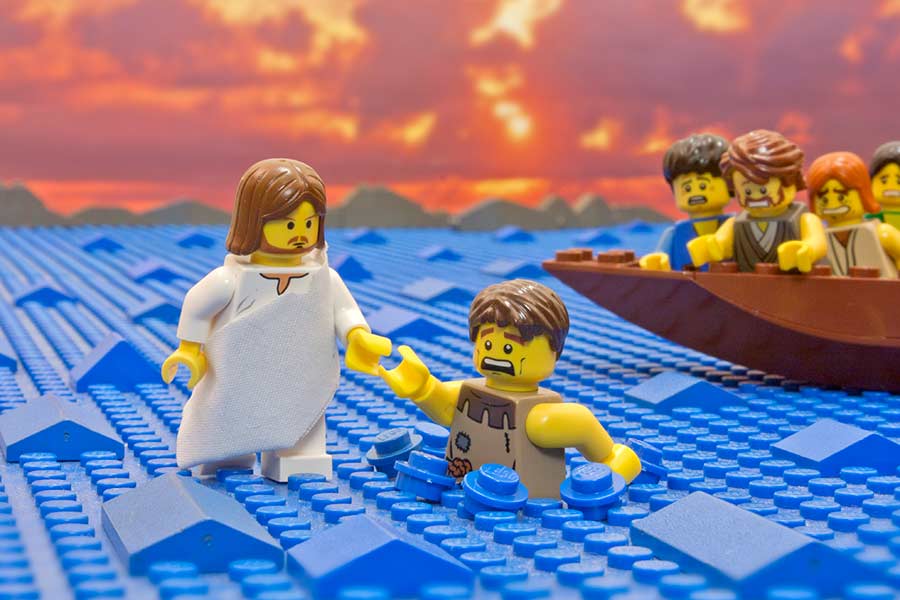Since the days of Adam and Eve, Heavenly Father had promised to send his Son into mortal life on earth to become our Savior, and finally the appointed time had come. At this point in history, about 2,000 years ago, the Israelites in the Holy Land were known as the Jews, and they were in a state of apostasy and spiritual darkness, ruled over by the Roman Empire.
Over 700 years earlier, the prophet Isaiah had foretold that Jesus would be born to a young virgin. Indeed, Heavenly Father now sent the angel Gabriel—who had lived as Noah during his mortal life—to announce to a young Jewish virgin from the town of Bethlehem named Mary that Heavenly Father would impregnate her, and she would give birth to the Son of God.
Jesus Christ was born on April 6 in 1 BC as a half-deity—the only person in the history of our world to be born of an intermixture of divine and mortal parentage. As such, he was unable to be killed unless he willed it so. Like all mortals, however, the veil of forgetfulness caused him not to remember his premortal existence, so he was unaware that before birth he had been Jehovah, the God of the Old Testament.
Sources:
• The Life and Teachings of Jesus and His Apostles, (1979), 21–25
• New Testament: Gospel Doctrine Teacher’s Manual, (2002), 5–8
• The Life and Teachings of Jesus and His Apostles, (1979), 9–31
• Gospel Principles, (2011), 50–58
• Old Testament Student Manual Genesis-2 Samuel, (1980), 44–48
Like his mortal mother, Jesus was subject to hunger, thirst, fatigue, and pain. From his immortal and glorified father, Jesus inherited greater power than any other man, including power over death. By age 12, Jesus was wiser than the most profound doctors of law and divinity, and he realized that he had been sent to earth to do a special work that Heavenly Father wanted him to do.
Despite being subject to temptation, Jesus lead a sinless life and was the only perfect being to ever walk the earth. At age 30, Jesus began his public ministry. He walked the roads of Palestine and taught the Plan of Salvation and Exaltation by which mortals can become creator gods like Heavenly Father.
He went about doing good, healing the sick, and raising the dead. He taught people how to live, and to always help the hungry, the cold, the naked, and the lonely. And yet people despised him and said he was a drunkard or that he was possessed by devils. Only righteous people recognized him as the Son of God.
Those who believed Jesus became his followers, and Jesus organized them as the only true church—the Church of Jesus Christ—and its members were called Saints. Jesus chose twelve men to lead the Church as his Apostles, and he conferred on them the priesthood. Other officers in the Church were made elders, bishops, teachers, and deacons.
At the end of his mortal ministry, Jesus prepared to make the ultimate sacrifice. The night before he was crucified, Jesus went to a garden called Gethsemane. There he began to take upon himself the punishment for all the sins of everyone who ever lived or ever will live. He trembled in pain, struggled, and groaned—bleeding from every pore as he underwent spiritual suffering and agony far beyond mortal comprehension.
The next day this overpowering torture was continued on the cross as Jesus faced every horror that Satan could inflict upon him. At his hour of greatest distress, Heavenly Father withdrew from Jesus's presence so Jesus could finish paying the penalty for the sins of all mankind, prompting Jesus to cry out in agony, "My God, my God, why hast thou forsaken me?"
As Heavenly Father witnessed from heaven the awful suffering and torment of his beloved Son, the burden he faced is incomprehensible. Every impulse and instinct must have been for him to intervene—to send angels to rescue Jesus. But he did not intervene because this was the only way a vicarious payment could be made for our sins that would satisfy the law of justice.
His agony was so intense it burst forth from his body and spread out through all space, convulsing nature. As Jesus died, the foundations of the earth trembled, massive earthquakes shook the land, mountains sank, valleys rose, and the cities of men were engulfed in water or consumed in fire. The Savior was dead.
Of all the peoples of earth, it was a practical necessity for it to be the Jews to whom Jesus was born. He needed to have lived among a particularly wicked people, for if any other nation had witnessed the amazing miracles of Jesus, they would have repented. Only the Jews were stubbornly wicked enough to kill their own God.
Sources:
• 2 Nephi 10:3-6
NEXT:
Also from the creator of The Brick Book of Mormon:

